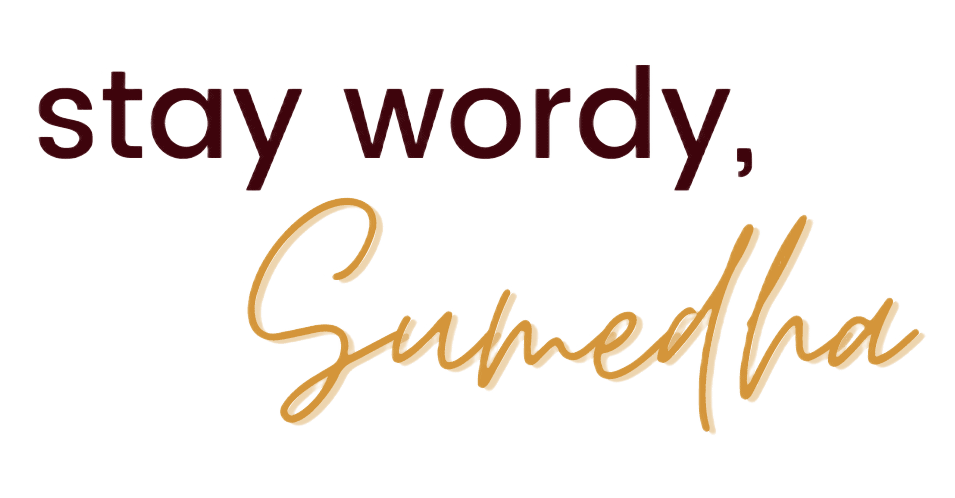There are several ways to format book reviews and hence it can be hard to pick one. Especially when you're in a blogging slump or don't know how to begin the review.
At such times, seeing other reviews for inspiration or options helps. It can give you an idea of how you want your book review to look and inspire you to start writing it.
This guide will help you write great reviews by listing out ideas, providing examples and inspiration—all in one place. We book bloggers need some help from time to time.
I was actually looking for a guide with book review formats to help with my indecision. When I googled variations of this title, I did not find any posts! So here I am, writing this guide, instead of writing the review that I've been procrastinating on for months 🙂

how to write a book review for your blog
Yes, this post is about formats but it is good to start with the basics.
The first rule of writing book reviews on your blog is to throw away all the rules that you were taught.
Reviewing books on blogs is very different from what we are taught in school. I definitely don't review the way I was taught. It is because that format is the standard for newspapers. Good formatting is very different for blogs.
Blogs are an entirely different domain with different features and requirements. You can do so much more with reviews on your blog.
Don't worry about going unconventional or trying a new review format. Those are fun. Don't think about sticking to the professional style as well. Shout in your reviews, if you want to! Use all caps, bold, GIFs, images—whatever you like.
It is YOUR blog. The only rules in place are the ones made by you. Instead of seeing how to write reviews that others will read, just write what you want to say. And choose a review format that fits what you want to say.
basic book review layouts
There are three basic parts in every review—introduction, basic information on the book, and your review.
The introduction is a few lines where you can say how you came across the book, why you picked it up, and a line on whether it surprised you or not. Or, it can be a short catchphrase to hook in readers. For example, "this book blew me away. I was not ready when I picked it up."
Basic information on the book can include title, author name, genre, category, blurb, publisher etc. You can also mention how you acquired it (bought/review copy).
The review part is where you explain your opinions and discuss the book. The 10 review formats that I'll mention soon is for this section.
There are three popular and basic layouts. Most people choose one and stick to it throughout their blog, but you can switch it up if you like.
- The book's information first, introduction, then review body. This is an easy format that a ton of book bloggers go for. Example: Dedra's review of Float Plan.
- Introduction, the book's information, and then review body. This is another fun way because you can give an introduction first without dealing with the blurb etc. Example: my review of The Right Swipe.
- Introduction, review body, and information on the book at the last. Use this when you want your words to be the highlight and stick the basic info at the end, in case people want to see it.
You can skip the basic book info if you want but you'll have to give a brief on the book's plot yourself.

book review format ideas
Now onto the main part of the post. All the suggestions in this post are standard formats that you can take and apply to your reviews easily if your thoughts fit the format.
These ideas are for book reviews as individual blog posts but you can modify them for mini-reviews and social media reviews.
Note: I am NOT mentioning reviews that are free-flowing thoughts because those reviews don't involve a standard format across and are more specific to books and thoughts.
1. divide your review into basic categories
This is the most popular and easy method of formatting reviews. Choose categories and explain your views below the subheadings.
Basic categories are ones that everyone recognizes. For example plot, characters, writing style, and representation. The categories can change based on the genre. Romance books can have "romance" and "chemistry". Fantasy books can have "world-building". Mystery or thriller books can have "suspense".
Example reviews: Erin's review of Fable duology, my review of Drag Me Up
2. CAWPILE rating + review system
This is a rating system devised by Book Roast which makes your decision process easier when rating books. It is a categorized system that is standard across genres so you always have set categories to consider.
It can also extend into a reviewing format as you can mention your individual rating and explain why you gave that rating.
The categories and more are explained by the creator in this video.
3. divide into "liked" and "disliked" sections
This format is good if you have clear opinions on what you liked and didn't like. It is not good when you have conflicting thoughts about something.
Additionally, you can also have "liked", "it was okay", and "didn't like" sections.
Another way to phrase this would be "enjoyed" and "didn't enjoy."
Note that this review format is highly subjective so it is good for book reviews where you don't want to talk from a neutral perspective and want to only share your experiences and opinions.
Example: Marie's review of Crier's War

4. divide into pros and cons sections
This is similar to the above review format but it is suitable for more neutral reviews i.e. reviews where you're stating facts like "this exists" which is generally a pro or a con like diversity, plot tropes etc.
To give you an idea, a pro for me is friends-to-lovers romance and con would be a bad/unnecessary third act break up in romance books.
Example reviews: Shealea's review of The Bone Shard Daughter
5. review using book-specific subheadings
Instead of using the basic categories, you can use custom and specific categories for the book. The categories can be "a great character arc", "disappointing ending", "brilliant chemistry" etc.
How to go about writing this review: note down the biggest things you want to talk about like "well-rounded characters", "contradicting plotlines", "plot holes" etc. Make these your subheadings and expand upon each of the points under them.
This does require a little bit of planning before starting the review. But it is a great format if you can't go into a review without a plan.
6. list reasons why others should read the book
This is a great review format for books that you loved and want people to read. The title is catchy as well, so people are more likely to read your review.
The reasons can act as subheadings and you can expand on the point below the heading.
This also requires planning beforehand about the reasons you want to list. Make some notes with what you liked about the book, see if they can fit into "reasons", make a list of the reasons, and then start writing the review.
Examples: my review of The Henna Wars
7. reviews with discussions
This format is good for book reviews where the book includes a topic that you're very passionate about or you have a lot to say about the topic which is tangentially related to the book. Sometimes the posts may be more discussion than a review of the book, but it's okay! Many times, discussion posts do better than reviews so this would be hitting both categories.
These posts are rarer (from what I've seen, probably because they involve a lot of effort and opinions) but are very interesting to read. They include discussions, rants, and raves along with thoughts on the book. It's a great way to convince people to read a book you love or completely mark off a book you didn't like.
Examples: Anukriti's review of Loveless with a discussion on representation and college life, my review of Fahrenheit 451 discussing books along with annotations

8. "thoughts while reading" reviews
These are almost like vlogs. You take the reader with you on your experience of reading the book. This is a fun way to review books if you want to showcase your feelings/thoughts, especially if the book has a lot of plot twists or invoked a ton of feelings in you. You can annotate when reading or make notes elsewhere and use it for this review.
This would be very fun with spoiler-filled reviews. Doing it spoiler-free would be a bit of a challenge.
Examples: Isabella's review of We Free The Stars, Riza's review of This is How You Lose The Time War
9. spoiler-free and spoiler-filled sections
This is for when you NEED to talk at length about parts in the book that are spoilers but also want to pitch the book to new readers.
Having spoiler-free and spoilers-aplenty sections is very fun. I almost always do it with my Kdrama reviews, and it can be done with book reviews too!
Example reviews: my review of This Is How You Lose the Time War, Mehek's review of Tiny Pretty Things
10. free-flowing thoughts that are loosely categorized
This is a very popular, and sometimes easy, reviewing style. It can make the reader feel like they are having a casual conversation with you as the entire review flows together.
At the same time, there are clearly sections in the review which makes it easier for you to write and for the reader to follow. This format is good whether you plan it beforehand or not. It allows both.
In order to subtly separate the sections of your review where you talk about different topics, you can use quotes as a divider. Quotes that match your points will fit in very well. Some bloggers use their custom post-dividers for this as well.
Note: try to highlight important parts of your review so that it is easier to skim. Yes, we'd love our readers to read every word but sometimes life is just too busy and highlights help.
Examples: my review of American Betiya, Minna's review of The Poppy War
11. book reviews with annotations
If you annotate your books, you HAVE to try writing reviews with pictures of your annotations. This way, you can share what resonated with you the most as well. Annotating books is very fun and I assure you that people will want to know how you annotate and your annotation process for every book. It doesn't get boring.
Examples: my review of Fahrenheit 451, Cosette's "annotate with me" post on Babel

additional elements to level up your reviews
Book reviews can be much more than just talking about the book. You can spice it up by including elements that can help the reader know more about the book. These are some suggestions that come to my mind but there are innumerable ideas that you can implement.
content and/or trigger warnings
I'm putting this under additional elements that you can add, but you SHOULD add them. Content and trigger warnings are NOT interchangeable. They mean different things. But you can use "content warnings" as a blanket term for both of them.
Just mention warnings somewhere in your reviews (I generally put them along with basic info) so that readers can be aware of any topics they may want to avoid.
Read this post by Marie to understand more on why you should include warnings.
"let's chat" section at the end
It can be termed "let's chat", "talk to me", "shout your opinions", or whatever else. You can include a section at the end with some questions for the readers. Basically, a call to action.
Book reviews are hard to comment on unless the reader has either read the book or connected to a topic in the book. You can make it easier for them to comment by adding questions to prompt them.
They can be general or specific questions relating to the book. Do include at least one general question as that would be easier to reply to.
your own short version of the blurb
Many bloggers include a few lines on the plot themselves even after including the basic information in order to explain more about the book. This is a grey area because sometimes it is redundant.
If you include the book's blurb in your review, and it explains everything, don't add another version of your own. Only do it if the official blurb is inadequate* or if you are not including the official blurb at all.
*I've seen this happen a lot with romance books which was why I used to write my own blurb. Some books have blurbs like "he is bad for me, yet I wanted him. But I can't have him." It's SO ANNOYING. Many times the book is actually good but the blurbs suck!

diversity/representation overview
Like content and trigger warnings, you can have a small section to mention the various representations present in the book. By representation, I mean factors like disability, mental illness, Asian-American characters, sapphic love etc.
This can be a helpful section if readers are looking for books with specific factors for readathons or challenges. Other times it just signals how diverse the book is.
Example: Gargee's review of American Betiya
custom ratings and rating images
First of all, I believe ratings themselves are optional. I don't use ratings on my book reviews anymore because they are not sufficient to indicate all that I want to say.
If you do include ratings, you can level them up by using images that relate to your blog theme like Leelyn.
You can also use a modified rating system like Shealea or completely switch it up to a system of your own.
links to Own Voices reviews
There is a ton of discussion on using the term "Own Voices" because experiences and views can be wildly different. Not all Indians would relate to my story and vice-versa. The publishing industry has also started to misuse the term which has caused many to stop using the term at all.
Read this post by Camillea to know more about the term "Own Voices" and what "Own Voices review" means.
In the end, I still think the term has its merits when it comes to reviewing. Especially because only Own Voices reviewers can properly point out accurate and problematic representations.
If you're reviewing a book that represents a marginalized group for which you are NOT an Own Voice reviewer, consider linking to Own Voices reviews. They might bring up important points that you would not have noticed.
For example, I quoted and linked Own Voices reviews in my review of Children of Blood and Bone. I simply didn't like the book and noticed some concerns raised when going through other negative reviews so I linked them in my review.

recommended if/avoid if
This is a cool way to end reviews. Readers can quickly make decisions about whether to pick up the book or not based on general tropes and factors.
mood boards/aesthetics
I've seen some bloggers do this and it is so fun to see! Mood boards and aesthetics can be images or collages that depict the book's setting or the characters.
For example, you can look at Cielo's review of The Invisible Life of Addie LaRue and Lila's review of Raybearer.
a quotes section
If you don't like adding a few quotes in the middle of the review, or simply have too many that you want to share, you can add a quotes section at the end and share your highlights.
These quotes can sometimes be enough to convince readers to understand the writing style and get hooked on the book.
For example, my review of Maybe You Should Talk to Someone.
book review checklist
When writing book reviews, we can be very focused on putting down our thoughts and might forget to include all the required elements in the review. To help, I've created a handy checklist of elements you should have in every book review to refer to before hitting publish.
Get the checklist in the free resource library!
endnotes
There is no right or wrong way to write a book review, especially on YOUR blog. The mentioned ways to format book reviews for your blog are just my opinions and suggestions. At the end of the day, you write your reviews and you should do it the way you like best.
You also don't have to stick to a format throughout your blog. Sure, it creates a brand, especially if it is a unique reviewing format (like what Kat @ Novels and Waffles used with on-brand terms like "ingredients", "kitchen of the author", and "cooking directions"). But sometimes, you need the flexibility to choose formats based on the books. Allow yourself to experiment and try out new things.
This is also not an exhaustive list of ways to format book reviews. There are so many unique styles and many more generic formats. These are the ones that are easy to pick up and apply to your reviews if you're stuck.
Related post: How to Make Your Blog Posts More Readable

chat with me!
Are you a book blogger? Do you use any of the review formats that I've mentioned in this post? Do you use any additional elements in your reviews?
What are your favourite kinds of reviews to read? Have I missed any easy review format? If so, do mention it in the comments and I'll mention your comment in the post!
Also, is there any blogger whose reviews you love to read because of their reviewing style or format? Give them a shoutout in the comments so the rest of us can admire them too!


Thank you! This was very helpful!
glad to help!
Great post! This will be handy for me to start structuring my blog posts!
glad to help!
Thank you for this article. I have a book blog and am working on smoothing out my posts. This was very helpful to me.
Glad you found it helpful!